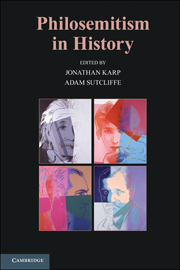Book contents
- Frontmatter
- Contents
- Notes on Contributors
- Introduction
- PART I MEDIEVAL AND EARLY MODERN FRAMEWORKS
- PART II THREE EUROPEAN PHILOSEMITES
- 4 William Whiston's Judeo-Christianity
- 5 A Friend of the Jews?
- 6 Ordinary People, Ordinary Jews
- PART III THE CULTURAL POLITICS OF PHILOSEMITISM IN VICTORIAN BRITAIN AND IMPERIAL GERMANY
- PART IV AMERICAN PHILOSEMITISMS
- PART V PHILOSEMITISM IN POST-HOLOCAUST EUROPE
- Index
- References
6 - Ordinary People, Ordinary Jews
Mór Jókai as Magyar Philosemite
Published online by Cambridge University Press: 05 June 2012
- Frontmatter
- Contents
- Notes on Contributors
- Introduction
- PART I MEDIEVAL AND EARLY MODERN FRAMEWORKS
- PART II THREE EUROPEAN PHILOSEMITES
- 4 William Whiston's Judeo-Christianity
- 5 A Friend of the Jews?
- 6 Ordinary People, Ordinary Jews
- PART III THE CULTURAL POLITICS OF PHILOSEMITISM IN VICTORIAN BRITAIN AND IMPERIAL GERMANY
- PART IV AMERICAN PHILOSEMITISMS
- PART V PHILOSEMITISM IN POST-HOLOCAUST EUROPE
- Index
- References
Summary
German Jews could not find a friend in Schiller; in Goethe they found a steadfast adversary. As long as we had Kazinczy the Jewish school supervisor, Bajza rallying and laboring for a Jewish teacher training institute, Vörösmarty watching with a heavy heart already during the 40s that equality and brotherhood have left the eternal Jews untouched in their suffering, Petöfi scolding the German burghers with all his might for daring to persecute the Jews, justice and love regulating Kossuth's behavior toward us, Pal Szemere and Ferencz Pulszky rushing to acknowledge our worth with great skill – we could envision a bright future; but among all of these our most sincere friend was none other than Mór Jókai.
Béla Vajda, “Jókai,” 1904, 246When he wrote these words in 1904, Béla Vajda, a late nineteenth-century Hungarian Jewish historian, captured the love affair between Hungarian Jewry and the great Hungarian romantic novelist Mór Jókai (YO-kah-ee). For more than a century, Jókai has been singled out as the Magyar philosemite par excellance. Jókai himself reinforced this view by extolling his own camaraderie with Jews, whom he regarded as fellow Magyars.
In the larger context of European philosemitism, however, Jókai is somewhat of an anomaly. His attitude toward Jews betrays little or none of the allosemitic tone that pervades the outlook of other philosemites, and nothing whatsoever of the missionary tone evinced by many English millenarians and comparably minded philosemities.
- Type
- Chapter
- Information
- Philosemitism in History , pp. 128 - 146Publisher: Cambridge University PressPrint publication year: 2011



